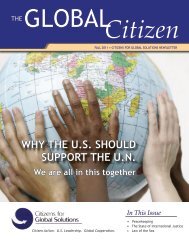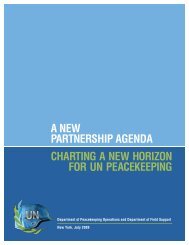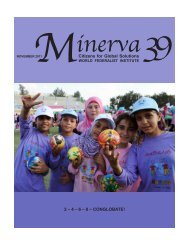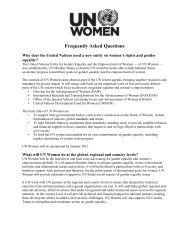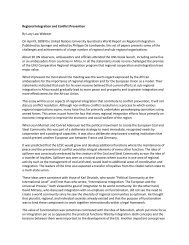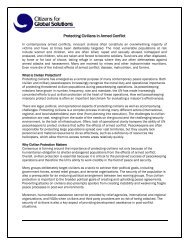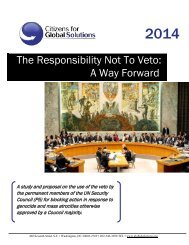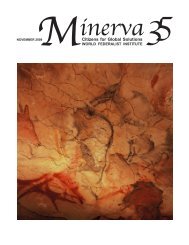Minerva, Spring 2008 (Volume 32) - Citizens for Global Solutions
Minerva, Spring 2008 (Volume 32) - Citizens for Global Solutions
Minerva, Spring 2008 (Volume 32) - Citizens for Global Solutions
You also want an ePaper? Increase the reach of your titles
YUMPU automatically turns print PDFs into web optimized ePapers that Google loves.
without the encumbrance of real or perceived<br />
imperial attitudes or ambitions.<br />
The Potential Importance<br />
of Civil Society Engagement<br />
The most essential basis <strong>for</strong> a legitimate<br />
system of global responsibility to protect<br />
would engage the active participation of<br />
local and regional communities. The past<br />
half century of professionalization and<br />
international institutionalization of development<br />
planning has created a culture in<br />
which outsiders arrive in problem areas<br />
to suggest and guide and sometimes to<br />
impose solutions. Should the historic experience<br />
and knowledge of the local people<br />
and the cultural region not be given similar<br />
respect? The past 200 years of economic<br />
growth has served some nations well, but<br />
it now seems clear that many nations might<br />
have developed in a manner that would<br />
have better served their people had the<br />
paths chosen been more firmly grounded<br />
in their own history. Now there are disturbing<br />
disjunctions. Should the salary<br />
of an engineer recruited as a driver <strong>for</strong> a<br />
“development expert” be higher than the<br />
salary of a construction engineer? How can<br />
community development become development<br />
of the people, <strong>for</strong> the people and by<br />
the people? How can democracy grow<br />
from existing historic roots? These are<br />
urgent questions to address if participatory<br />
development is to engender local power <strong>for</strong><br />
democracy. More local and regional leadership<br />
is needed to nurture power from the<br />
cultural roots of nations and peoples.<br />
The sources of terrorism lie in the alienation<br />
that arises in the people who are<br />
most disenfranchised at the bottom of an<br />
undemocratic world system where military<br />
imperial power is imposed on nations<br />
that are themselves deeply undemocratic,<br />
excluding their citizens from effective<br />
participation. Terrorists are recruited in<br />
countries that lack modern education and<br />
constructive opportunities where there is<br />
a backdrop of extreme poverty and a sense<br />
of anger at insults to the nation, the religion<br />
and the culture. Terrorists arise when it<br />
feels more empowering to participate in<br />
commitments to destroy than to participate<br />
in building.<br />
A major commitment is needed throughout<br />
the system of United Nations agencies, by<br />
individual governments, and by networks<br />
of NGOs to redeploy “development assistance”<br />
away from the experts and to give it<br />
to the people. All children deserve access<br />
to and engagement in modern education<br />
and experience of their own historic culture<br />
and of world community values as well<br />
as access to food, clean water, shelter and<br />
basic health services. If this is not available,<br />
the security of the entire world is<br />
put at risk. Locally generated community<br />
development can provide the key to bringing<br />
basic cultural and economic services<br />
to villages and cities throughout the world.<br />
People must be engaged in their own development<br />
and in their own security.<br />
There is an unused tool available <strong>for</strong><br />
locally-based community development in<br />
the largely hortatory commitments made<br />
by almost all governments throughout the<br />
world to various norms of international<br />
law and programs of action generated by a<br />
range of UN bodies and conferences. In the<br />
hands of the people this body of commitments<br />
can become a powerful tool—either<br />
<strong>for</strong> direct action or <strong>for</strong> putting pressure on<br />
one’s own government to fulfill its stated<br />
obligations. If local civil society groups<br />
were proactively involved doing what<br />
is needed to enhance implementation,<br />
they would not only achieve some of the<br />
objectives identified such as better access<br />
to clean water and sanitation, but they<br />
would build their own power to achieve<br />
and to protect themselves from any future<br />
economic exploitation or violation of their<br />
human rights. Such self-generated action<br />
can be coordinated with the work of international<br />
networks of Non-Governmental<br />
Organizations that could provide resources<br />
when invited and help connect with broad<br />
networks of governments and with the<br />
UN Security Council. The goal is to put<br />
the Security Council on call to serve the<br />
people, especially people in communities<br />
at risk of violence and exploitation.<br />
Empowering the People<br />
<strong>for</strong> Self-Rule and Democracy<br />
The goal is to <strong>for</strong>ge local and worldwide<br />
networks in support of UN norms as a<br />
counterweight to the power of the sorts<br />
of militias that played truly devastating<br />
roles in Kosovo and in East Timor. In<br />
most countries at risk of violence and human<br />
rights abuses, as well as those at risk<br />
of extreme poverty, there are many civic<br />
groups that can better mobilize themselves<br />
to act if they see an overarching strategy <strong>for</strong><br />
self-enhancement. The goal is to empower<br />
local communities that are embedded in<br />
their own cultures to use the global norms<br />
that fit their needs.<br />
In parallel with local action, international<br />
NGOs that respect cultural autonomy can,<br />
when asked, assist in monitoring human<br />
rights interests by keeping records of<br />
violations and making these available to<br />
the UN High Commissioner <strong>for</strong> Human<br />
Rights or to officials of the International<br />
Criminal Court. The role and the responsibility<br />
of individuals be<strong>for</strong>e international<br />
law is expanding. A major step <strong>for</strong>ward<br />
is represented by the International Criminal<br />
Court, making individuals as well<br />
as states responsible under international<br />
law. This is the best way to end the collective<br />
punishment inherent in war and in<br />
traditional <strong>for</strong>ms of interstate action <strong>for</strong><br />
collective security. It is the responsibility<br />
of the world community to protect people<br />
when the state in which they live will<br />
not or cannot prevent war crimes, crimes<br />
against humanity or genocide. But it is not<br />
the duty of anyone to do this in a way that<br />
leads to violence or undermines justice.<br />
Concepts of justice vary, but the ideas in<br />
the Universal Declaration of Human Rights<br />
are widely recognized. Almost none of<br />
the norms of the Universal Declaration<br />
have been denounced, but many remain<br />
unobserved. The citizens of every nation<br />
can insist that they be protected according<br />
to these norms by effective international<br />
law. If it is known that people are watching,<br />
potential wrong doers will be deterred.<br />
Local and global networks of civil society<br />
groups and of governments can monitor<br />
the implementation of agreed norms of<br />
humanitarian law.<br />
Asserting the Sovereignty<br />
of the People<br />
Civil society within countries at risk of<br />
conflict and international civil society<br />
groups can use preventive diplomacy to<br />
11 • <strong>Minerva</strong> #<strong>32</strong> • June <strong>2008</strong>



